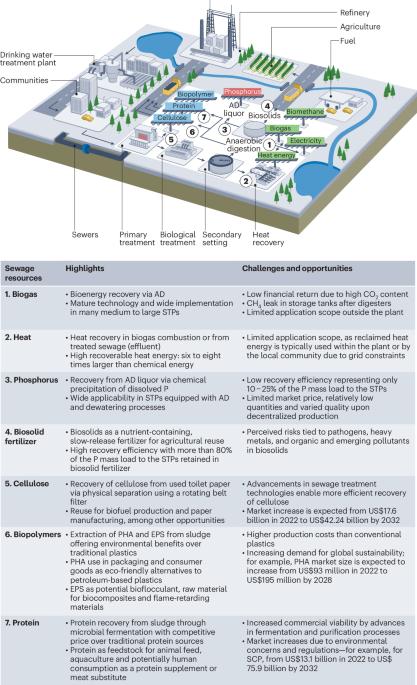从污水中回收先进资源的途径
IF 25.7
1区 环境科学与生态学
Q1 ENVIRONMENTAL SCIENCES
引用次数: 0
摘要
污水管理模式正在从污染控制向资源回收转变,这是循环经济不可分割的一部分。传统上,工作重点是回收作为生物能源的有机碳和作为营养物质的氮和磷。在过去十年中,已经开发出回收高价值商品的技术。与此同时,还提出了创新工艺,以生产可在污水系统中立即重复使用的化学制剂,从而促进污水管理。本综述评估了这些最新发展和基础科学发现,确定了主要挑战,并概述了实现更环保、更可持续的污水管理的路线图。从循环经济的角度来看,从污染控制到资源回收的污水管理模式转变是非常必要的。本综述介绍了这一领域的最新发展和主要挑战,并概述了实现更环保、更可持续的污水管理的路线图。本文章由计算机程序翻译,如有差异,请以英文原文为准。

Pathways to advanced resource recovery from sewage
The ongoing paradigm shift in sewage management from pollution control to resource recovery is an integral part of a circular economy. Efforts have traditionally concentrated on the recovery of organic carbon as bioenergy, and nitrogen and phosphorus as nutrients. In the past decade, technologies have been developed to recover high-value commodities. Simultaneously, innovative processes have been proposed to produce chemical agents that can be immediately reused in the sewage system to facilitate sewage management. This Review evaluates these latest developments and the underpinning scientific discoveries, identifies the key challenges, and outlines a roadmap towards greener and more sustainable sewage management. The paradigm shift in sewage management from pollution control to resource recovery is highly desired from a circular economy perspective. This Review presents the latest developments and the key challenges in this field and outlines a roadmap towards greener and more sustainable sewage management.
求助全文
通过发布文献求助,成功后即可免费获取论文全文。
去求助
来源期刊

Nature Sustainability
Energy-Renewable Energy, Sustainability and the Environment
CiteScore
41.90
自引率
1.10%
发文量
159
期刊介绍:
Nature Sustainability aims to facilitate cross-disciplinary dialogues and bring together research fields that contribute to understanding how we organize our lives in a finite world and the impacts of our actions.
Nature Sustainability will not only publish fundamental research but also significant investigations into policies and solutions for ensuring human well-being now and in the future.Its ultimate goal is to address the greatest challenges of our time.
 求助内容:
求助内容: 应助结果提醒方式:
应助结果提醒方式:


